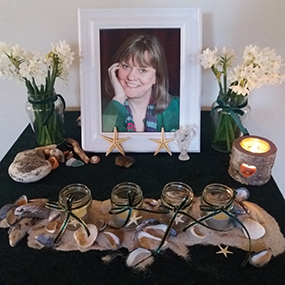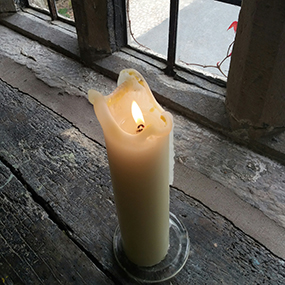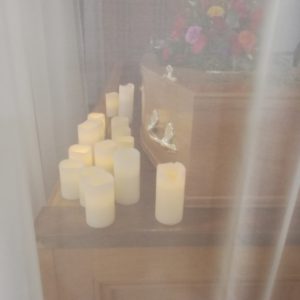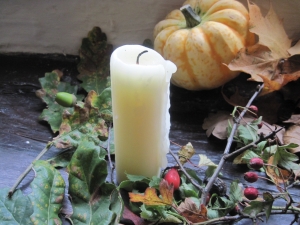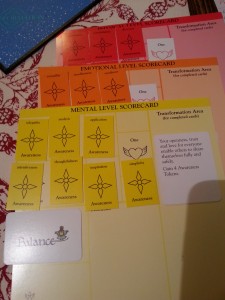Festive Grief. It seems odd to put the two words together and yet the reality is that you or someone you know will experience grief during what is considered to be the ‘happiest time of the year’.
Christmas Eve 2016
In the tradition of my German ancestors and ancestresses, I always celebrate Christmas on Christmas Eve. In 2016, as I watched the lights twinkling on the Christmas tree and relaxed with my family, I reflected on what a fabulous year it had been. We’d become grandparents for the first time. The year was also lovely because it wasn’t defined by anything awful and upsetting. Five years earlier, my husband had suffered a heart attack, and the following year my father was killed in a car accident in Australia. 2016, in comparison, seemed like a breeze! And the year got bonus points for bringing us such a beautiful granddaughter. I love Christmas: stollen, lebkuchen, twinkly lights, celebrating by candlelight, delicious meal, family. My mother had always made it such a beautiful and special time in our family and I hold this time as sacred. Every memory I had of Christmas was wonderful.
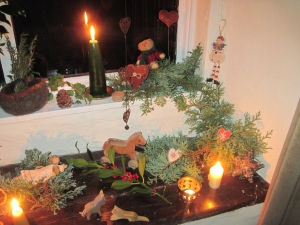
But, you know, nothing ever stays the same for long. That’s the nature of life and being human.
Christmas Day 2016
The morning of Christmas Day my best friend of 18 years was found dead in her charming Cumbrian cottage. I’ll spare you the details other than to say she chose to end her life. I should probably add that she hated Christmas. (Her father had died, when she was a child, the week before Christmas. 2016 was the 40th anniversary of his passing.) Over the years she’d spent a number of Christmas Eves with me and my family (I was always trying to rewrite her script and show that Christmas could be lovely! She ended up rewriting mine!)
As we approach the seventh anniversary of her passing (something I can’t even comprehend), I’m aware that this is the first Christmas I feel Christmasy and actually feel like celebrating. I even had the tree up by December 3rd. Most days since, I’ve been singing along to Christmas tunes. I was always a 1st December-get-that-tree-up sort of girl and played those carols non-stop till my birthday on the 28th. During these years since her death, I can’t even begin to imagine how unbearable I must have been to be around. My heart was heavy. It was as if I was a shadow of my former self. This death changed me. How could I ever celebrate Christmas again? It was ALWAYS going to be the anniversary of Pam’s death. A death that was chosen. What sort of friend was I to have let this happen?

When I put up my Christmas tree the other day, some of decorations which I placed were ones Pam had given me. Did I cry? No. I smiled. “Thank you Pam,” I said. In that moment I felt nothing but joy that she’d been in my life; and, in her own way, was with me for Christmas. She’ll know, more than anyone, that come Christmas I’ll have a moment in private somewhere to shed a tear or two (or twenty!) in remembrance. For better and for worse, she is forever more inextricably linked with Christmas.
It’s inevitable as the years pass that there’ll be more deaths in my life which will add to the various layers of grief that I live with, and they too will become part of my Christmas story (hopefully not in the dramatic way that Pam chose).
I know a thing or two about grief, personally and professionally. In my years as a funeral celebrant I have walked beside those whose hearts were blown apart by grief. For some of them, the death of their loved one happens close to Christmas. For others, this time of year is also the annual reminder that they won’t be sharing a festive meal or gifts under the tree. The Christmas-time ceremonies I’m asked to officiate have such an added gravity to them. I usually come home to bed afterwards and cry for the family.
What have I learnt? Only this: No one can tell you how to grieve or when to grieve. Even though well intentioned, NO ONE knows how you’re feeling. It’s an impossibility. The relationship you had with your loved was unique to you. People who aren’t grieving can find it rather an inconvenience that you’re not ‘on top of things’. I certainly learned who I could count on and who wasn’t able to hold space for me (pretty much everyone).
Be kind to yourself. Grief never ends but the way you live with it does. Do whatever you need to do to walk through this season with all its festivities, bright lights, fun and laughter.
Step back without apology.
Decline invitations if that feels right.
Do not feel obligated to take part in any Christmas traditions.
If you can, though, accept the love of those who are kind enough to offer it. In my darkest moments, the hugs from a loved one held me when I couldn’t hold myself. Sometimes we just have to lean into another. And if you don’t have anyone, lean against a tree. It might sound daft, but try it. Trees are strong. They’re rooted. They aren’t going to go anywhere, and they’re not going to turn you away. Nature is a balm.
- Place your loved one’s photo/s under the tree (if you’re having one) or somewhere they are visible
- Talk to them as if they were in the room with you (no, you’re not going mad)
- Create a new ritual that includes them in your festive season
- You might like to have a bespoke decoration made with their photo or name so that it is visible each year.
Time doesn’t heal. (Whoever said ‘time is a healer’ clearly hadn’t yet been kicked in the guts by grief!)
Time does make things feel, shall we say, a little softer. But how long that takes isn’t something any of us knows until it happens.

Veronika Robinson has been officiating beautiful, bespoke ceremonies since 1995.
As a funeral celebrant, she officiates ceremonies across Cumbria and into Scotland, Lancashire and Northumberland. She is a certified Infant Loss Professional; founder of Penrith’s first Death Café; is a celebrant for the charity Gift of a Wedding. Along with her husband, Paul, she’s a tutor at Heart-led Ceremonies Celebrant Training
Veronika is the author of many books including the popular Celebrant Collection: Write That Eulogy; The Successful Celebrant; Funeral Celebrant Ceremony Planner; Wedding Celebrant Ceremony Planner; The Blessingway. Three more titles will be added in January 2024: The Gentle Celebrant’s Guide: Funerals For Children; The Discrimination-free Celebrant; The Celebrant’s Guide to the Five Elements.


